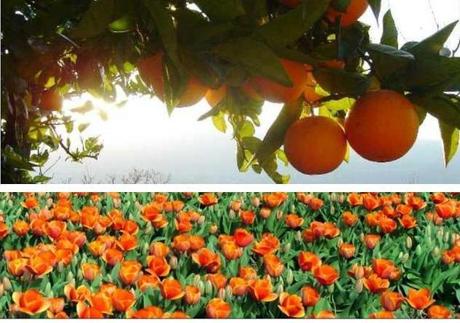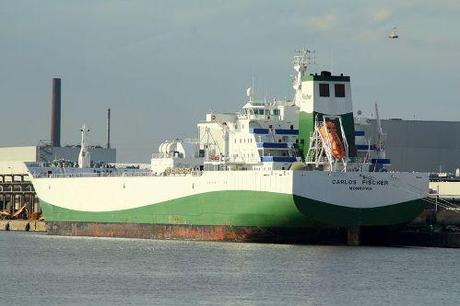An orange—specifically, the sweet orange— is the most commonly grown tree fruit in the world. The orange is a hybrid of ancient cultivated origin, possibly between pomelo (Citrus maxima) and mandarin (Citrus reticulata). It is an evergreen flowering tree. Orange trees are widely cultivated in tropical and subtropical climates for the delicious sweet fruit, which is peeled or cut and eaten whole, or processed to extract orange juice, and also for the fragrant peel. Orangesprobably originated in Southeast Asia. The name is thought to derive ultimately from the Sanskrit for the orange tree, with its final form developing after passing through numerous intermediate languages.
 Orange juice is a popular beverage made from oranges. It is made by extraction from the fresh fruit, by desiccation and subsequent reconstitution of dried juice, or by concentration of the juice and the subsequent addition of water to the concentrate. The term "orange juice" or "OJ" is also used, both colloquially and commercially, to refer to all of these forms. Orange juice is a classic American beverage. For years, people have chosen orange juice for its great taste and nutrition benefits. It is believed that early Spanish explorers planted the first orange trees around St. Augustine in the 1500s and years later, Fresh Florida oranges became popular around the world. Squeezing Floridaoranges for the great-tasting juice they produced became a popular delight. The Florida citrus industry devoted years to researching ways to provide the world with access to tasty orange juice in their own homes. Through pasteurization and state-of-the-art technology, the goodness of orange juice was available everywhere.Orange juice is almost a compulsive part in most hotel breakfast menu. Today, in most places people enjoy a consistent supply of high quality, nutritious orange juice all year long. A glass of orange juice is a simple and nutritionally sound way to start the day. Orange juice, as part of a healthy diet can help maintain good health and wellbeing, and may help reduce the risk of certain diseases. Orange juice of course gets transported globally and the primary key to successful aseptic transportation of a sensitive juice such as NFC is not only sterility, preventing the entry of oxygen and ensuring a homogeneous suspension of solids in the stainless steel tank(s). Also the very accurate temperature control of the cargo cooling plant is an important aspect. Surprised to learn that are there are specialized vessels which transport ‘Orange juice’ alone………..
Orange juice is a popular beverage made from oranges. It is made by extraction from the fresh fruit, by desiccation and subsequent reconstitution of dried juice, or by concentration of the juice and the subsequent addition of water to the concentrate. The term "orange juice" or "OJ" is also used, both colloquially and commercially, to refer to all of these forms. Orange juice is a classic American beverage. For years, people have chosen orange juice for its great taste and nutrition benefits. It is believed that early Spanish explorers planted the first orange trees around St. Augustine in the 1500s and years later, Fresh Florida oranges became popular around the world. Squeezing Floridaoranges for the great-tasting juice they produced became a popular delight. The Florida citrus industry devoted years to researching ways to provide the world with access to tasty orange juice in their own homes. Through pasteurization and state-of-the-art technology, the goodness of orange juice was available everywhere.Orange juice is almost a compulsive part in most hotel breakfast menu. Today, in most places people enjoy a consistent supply of high quality, nutritious orange juice all year long. A glass of orange juice is a simple and nutritionally sound way to start the day. Orange juice, as part of a healthy diet can help maintain good health and wellbeing, and may help reduce the risk of certain diseases. Orange juice of course gets transported globally and the primary key to successful aseptic transportation of a sensitive juice such as NFC is not only sterility, preventing the entry of oxygen and ensuring a homogeneous suspension of solids in the stainless steel tank(s). Also the very accurate temperature control of the cargo cooling plant is an important aspect. Surprised to learn that are there are specialized vessels which transport ‘Orange juice’ alone……….. special vessel - Carlos Fischer.. pic courtesy : www.marineinsight.com
special vessel - Carlos Fischer.. pic courtesy : www.marineinsight.comOne such vessel is Orange Sky of GEA Grenco B.V. which has a cargo cooling plant onboard the converted refrigerated juice carrier named Orange Sky. The delivery was made to LloydWerft Bremerhaven GmbH on behalf of the Swiss owner Atlanship S.A.early October 2002. Unlike other refrigerated juice carriers the Orange Sky is a unique vessel due to its ability to transport two of the main orange juice categories: Frozen Concentrated Orange Juice (FCOJ) and Not-From-Concentrate (NFC) at the same time.• Frozen Concentrated Orange Juice (FCOJ), which is reconstituted by consumers at home by adding water to the concentrate. Although this is often the cheapest form of juice, it is also the least convenient, and again, the evaporation process affects the flavor. At one time frozen orange juice dominated the market, but today, more consumers enjoy the convenience of ready-to-drink orange juice. • Not-From-Concentrate (NFC) ready-to-drink juice is 100% pure squeezed juice with nothing added or taken away. It's pasteurized and sold in cartons, bottles and jugs clearly labeled "Not From Concentrate." When properly chilled, it has a shelf life of between 45 days and two months. There is also the Orange Star (IMO: 7342976, Port of registry: Monrovia, Liberia), built in 1975 as 'Andalucia Star' by Smith's Dock Co. Ltd, Middlesbrough. The vessel was initially designed as a refrigerated fruit carrier, primarily for bananas being fitted with side (banana) doors and air change fans, for loading in Central American ports. She was converted into a refrigerated orange juice carrier at Bremer Vulkan's in 1986. She is used to transport orange juice from Santos to Europe. A typical juice carrier transports approximately 32,000 m3 of juice per trip. This is equivalent to 32 million one-liter cartons. The juice – whether in fresh or concentrated form – is stored in stainless steel tanks on board. The juice is pre-cooled before being stored on board, after which systems go into action. These systems must ensure a temperature of - 10 °C for the concentrated juice. Direct juice is stored just above the freezing point: a process in which precision is critical, since the juice must not by any means be allowed to freeze. Normally, a double, indirect system provides the refrigeration:ice packs cool a brine solution, which is pumped to the insulated cargo holds. There, air coolers cool the air around the tanks. In new ships, the preferred refrigerant is ammonia, owing to its environmentally friendliness. With regards – S. Sampathkumar.
23rd May 2013.

